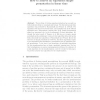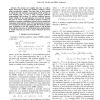26 search results - page 1 / 6 » How to Achieve an Equivalent Simple Permutation in Linear Ti... |
RECOMB
2007
Springer
14 years 4 months ago
2007
Springer
The problem of Sorting signed permutations by reversals is a well studied problem in computational biology. The first polynomial time algorithm was presented by Hannenhalli and Pev...
ESA
2005
Springer
13 years 10 months ago
2005
Springer
We introduce a new way to compute common intervals of K permutations based on a very simple and general notion of generators of common intervals. This formalism leads to simple an...
CPM
2004
Springer
13 years 10 months ago
2004
Springer
A popular approach in comparative genomics is to locate groups or clusters of orthologous genes in multiple genomes and to postulate functional association between the genes contai...
CDC
2010
IEEE
12 years 11 months ago
2010
IEEE
We present new insights into how to achieve higher frequencies in large-scale nonlinear predictive control using truncated-like schemes. The basic idea is that, instead of solving ...
EOR
2011
12 years 11 months ago
2011
A simple game is a pair consisting of a finite set N of players and a set W ⊆ 2N of winning coalitions. (Vector-)weighted majority games ((V)WMG) are a special case of simple ga...



